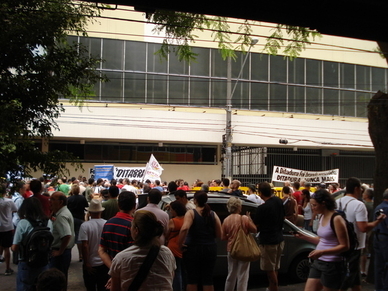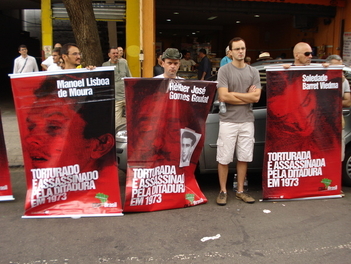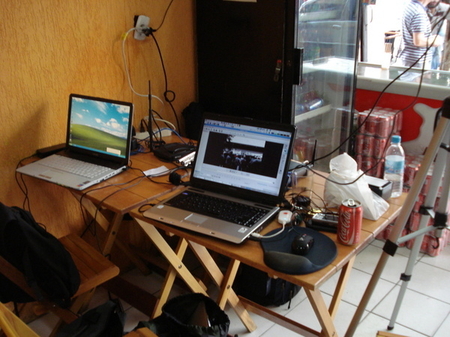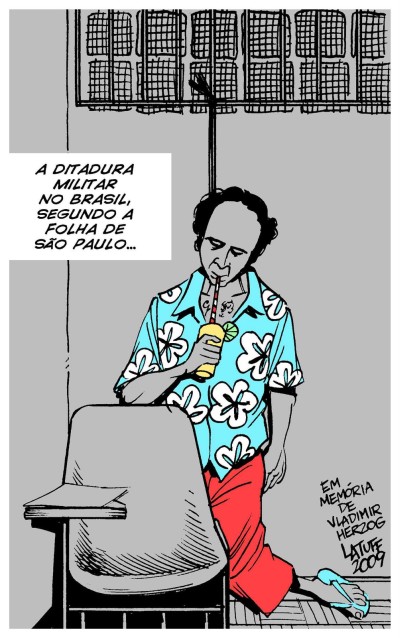On February 17, Folha de São Paulo newspaper assessed Hugo Chávez's victory in a referendum allowing indefinite re-election in Venezuela in an editorial called the “Limits to Chávez”. In this piece, Folha put Hugo Chávez, Alberto Fujimori and the 1960s/1970s South American military dictators in the same lot. The newspaper then called the Brazilian military dictatorship Ditabranda, a neologism that would sound, in English, something like “dictatormildship”, suggesting that the period following the 1964 coup d'état was mild. The op-ed says [pt]:
“(…) Mas, se as chamadas ‘ditabrandas’ – caso do Brasil entre 1964 e 1985 – partiam de uma ruptura institucional e depois preservavam ou instituíam formas controladas de disputa política e acesso à Justiça -, o novo autoritarismo latino-americano, inaugurado por Alberto Fujimori no Peru, faz o caminho inverso. O líder eleito mina as instituições e os controles democráticos por dentro, paulatinamente”.
There were countless reactions on the blogosphere to this op-ed, a petition gathered over 7,500 signatures in a week, and this Saturday the protest went offline. Bloggers from São Paulo and other parts of the country, some of whom travelled up to 20h by bus to get there, demonstrated in front of the newspaper office. The event was organized and spread by online word of mouth over a a week. During the 3 hours rally, the protestors live blogged directly from there through a linux and open source based wi-fi network. As the start time drew close, Guto Carvalho announced on Twitter:
Check the live aggregrator [pt] to see all the activity. Economia Solidária [pt], one of the participating blogs, notices the power of the blogosphere:
Alguns dias atrás o google pouco acusava se pesquisado “ditabranda”, hoje já são 172.000 resultados.
Here is the first photo, by gutocarvalho via TwitPic. And @joildo re-tweets and comments:
“A materialização de um protesto organizado a partir da internet”
The banners give people's names and the date they were tortured and assassinated. Photo by gutocarvalho
The improvised digital base in a snack bar. Photo by gutocarvalho
The blogosphere talks – and it is not mild chat
Eduardo Guimarães [pt], one of the organizers of the protest and the mastermind blogger behind the NGO “Medialess Movement”, has posted a number of articles about the use of the neologism. In one of them, he says that the readers’ reactions to his other posts have made him realise that Folha's op-ed sent chills down many people's spines. He asks: “Was it out of nostalgia or a ‘project'?”
Todos nos arrepiamos porque faz sentido, ainda que inconscientemente, entender que, quando todas as opções para retomar o poder pelas vias democráticas faltam, esses que já engendraram ditaduras, defenderam-nas e com elas colaboraram, não custa muito para terem novas idéias do tipo.
Quando se fala em imprensa golpista, muitos entendem que é porque ela tentou derrubar Lula com o escândalo do mensalão, mas não é. A razão é bem outra. A razão é a de que essa imprensa já derrubou vários presidentes no decorrer da história, alguns tendo sido “derrubados” naquele sentido que os traficantes de drogas costumam dar ao abate de seus desafetos.
It sent chills down everyone's spine because it makes sense, even if unconsciously, to understand that when those who have engendered, defended and cooperated with dictatorships lack options to return to power by democratic means, it does not take much for them to come up with similar new ideas.
When we talk about a media coup, many people believe that it is because the media has tried to overthrow Lula with the Mensalão scandal, but this is not quite it. The reason is quite different. The reason is that the press has already toppled several presidents in the course of history, some of them have been “overturned” in the same way that drugdealers often slaughter their enemies.
Many bloggers have published the image below, a charge drew by Latuff especially for the protest, showing Vladimir Herzog dead, drinking caipirinha and the caption: “The Brazilian military dictatorship, as per Folha de São Paulo”. Herzog was a Brazilian Jewish academic and journalist who was tortured to death by the state's repressive apparatus in 1975. At the time, the military had been in power for over ten years. Pinto [pt] says:
Fixo-me na imagem. Um jornal dos que o subvencionam e já se disse “o das Diretas” logrou este impensável: subverteu um ícone dos Anos de Chumbo e o tornou objeto de escracho não contra quem o produziu, mas contra quem deveria combatê-lo antes de qualquer coisa. Compreenda-me bem. Não me incomoda o escracho em si. À memória do Vlado dano pior fizeram os milicos. Tento aceitar, embora seja difícil, que justo um jornal tenha sido a força-motriz dessa guinada semântica.
Celso Lungaretti [pt] has noticed that the paper did not acknowledge correctly all messages of complaint about the op-ed in its Letters to the Editor section. In the first week, the broadsheet gave a proportional amount attention to the letters it received, 13% of which were related to the “ditabranda” case. But this did not last into the week after:
Já na semana de 22 a 28 de fevereiro, a proporção de mensagens sobre a “ditabranda” até cresceu, para 20%. O que diminuiu foi o interesse da Folha em destacar uma discussão que se tornava cada vez mais indigesta para ela.
Portanto, dentre as 69 notas que saíram no Painel do Leitor, míseras quatro (5,8%) abordavam o assunto que, para o público do jornal, era o mais importante do período, à frente até do “Governo Lula” e da “crise econômica”, sobre os quais apenas 6,4% e 5,3% dos leitores, respectivamente, sentiram-se compelidos a escrever à Folha.
Therefore, out the 69 letters published on the Letters to the Editor, only four (5.8%) addressed the most pressing issue of the period according to the newspaper's public, ahead even of the issues of the “Lula government” and the “Economic crisis”, about which only 6.4% and 5.3% of readers, respectively, felt compelled to write to the paper.
The total number of complaints over a 10 day period from February 17 was 174. Despite the fact that an ombudsman's work does not comprise opinions published by the newspaper in op-ed pieces, the newspaper's Ombudsman, Carlos Eduardo Lins da Silva, also says that Folha's response has been less than acceptable in the first week:
An editorial referring to Brazil's former military regime provoked letters published in Letters to the Editor. A response by the newsroom to two of them on Friday was outside the standards of cordiality which I believe are essential for the newspaper to hold its readers.
Folha has lost at least one reader. The newspaper's attitude has made Idelber Avelar [pt] take the decision to cancel his subscription to the group's online service. He has also confirmed his thesis that mainstream media staff have no clue of the importance of readers, who can now participate and have a loud voice. Now that the Internet is the key platform for protest, “they blame the thermometer for the temperature”. He says:
Todas as fontes confirmam que o impacto do episódio fez com que se batessem muitas cabeças na redação da Folha de São Paulo. Sem saber muito bem como lidar com a grande repercussão, sem ter a dignidade de se desculpar, desprovido da transparência de repensar a sua colaboração com a ditadura, o jornal embarcou numa sequência de emendas que pioraram muito um já péssimo soneto. Publicaram umas poucas linhas de Benevides e de Comparato, sem resposta injuriosa mas sem retratação. Escalaram um colunista, Fernando Barros e Silva, para “discordar” do editorial num texto cuja ênfase maior era uma bizarra comparação entre a metáfora usada por Comparato – de que o jornal deveria se desculpar ajoelhado em praça pública – e os métodos da Revolução Cultural chinesa (haja liberdades com as metáforas alheias!). O coroamento foi um post de Marcelo Coelho que afirmava que “há pelo menos 30 anos, a Folha reprova o autoritarismo”, omitindo a simples matemática de que em 1979 a Folha já tinha 15 anos de leais serviços prestados à ditadura militar.
Suggested reading:
Torture in Brazil – A Shocking Report on the Pervasive Use of Torture by Brazilian Military Governments, 1964-1979, Secretly Prepared by the Archiodese of São Paulo, in translation by Jaime Wright.
On Global Voices: Brazil: Light on the dark dictatorship days
Update: 08/03/2009
In this Sunday's issue, Folha has apologised at last. They have also covered the protest. Antônio Melo [pt] says this is still not enough:
A pressão fez a Folha recuar. Hoje o jornal publica nota em que o diretor de Redação e herdeiro do jornal, Otavio Frias Filho, reconhece que foi um erro chamar a ditadura brasileira de ditabranda. Menos mal. No entanto, Otavinho, como é conhecido, insiste em atropelar a realidade ao fazer interpretação literal de uma carta do professor Fábio Konder Comparato, e, pior, volta a ofender o professor e a professora Maria Victória Benevides, chamando-os de “democratas de fachada”. Com isso ele consegue corrigir-se no essencial, mas, como um legítimo neocon, cai atirando. Sua expectativa com a nota é tentar transformar o mea culpa a que se viu obrigado de uma “quase derrota” em uma “quase vitória”. Erra novamente.












8 comments
There are some more pictures of the protest at the Flickr’s album: http://www.flickr.com/photos/tags/ditabranda/
And videos: http://www.youtube.com/view_play_list?p=A2AD6FD28908373F